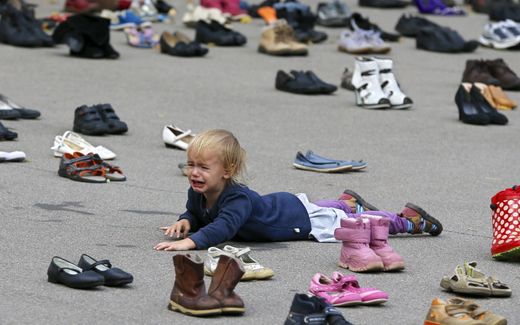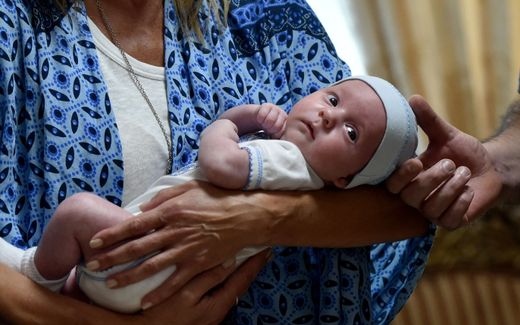Why Christians should watch what they wear
23-06-2023
Opinion
Kevin DeYoung, WORLD News Group

"Healthy modesty says "I have something to keep private, not because I hate my body, but because the body God gave me is so good, beautiful, and pleasing that I am not going to reveal it to everyone."" Photo ANP, Ramon van Flymen
Opinion
Revealing apparel is a way to compensate for a lack of faith in what makes us truly beautiful, Kevin DeYoung writes. Dressing modestly is an important way we honour God and love one another, he argues.
There are many complicated and confusing theological issues in the Christian life—issues that require deep intellectual research and sophisticated analysis, issues that call for multidisciplinary scholarship and expertise, issues that cannot be meaningfully addressed in an opinion column of several hundred words.
Thankfully, modesty is not one of those issues.
Catalogue
It seems that at least once a year, probably around spring and summer, Christians start arguing about modesty. As a pastor and a parent, I know this is a real-world issue that we can’t avoid. The biblical commands regarding modesty are something we will either heed, however imperfectly, or simply ignore. We should choose the former. To be sure, these discussions are always culturally conditioned and full of grey areas. The Bible doesn’t give us a catalogue from Promise Lands’ End (I’m sorry, I couldn’t resist) featuring acceptable outfits and divinely approved bathing suits. Modesty won’t look exactly the same in every time, in every place, and in every context. But modesty in dress—and that’s the kind of modesty I’m thinking about in this piece—does mean something, and we can get to that something if we keep three simple truths in mind.
One, modesty can be too rigidly applied and too insensitively enforced. It’s hard to talk about modesty with Christians without someone recalling their harrowing experience with dresses that weren’t supposed to rise above the ankle, or with youth retreats doling out detailed lists of do’s and don’t’s, or with parents enforcing conformity to an austere aesthetic without much in the way of explanation or grace.
And this is to say nothing of the awkward conversations—cringey at best and totally inappropriate at worst—that Christian men sometimes have with Christian women about their clothes or their figure. Since modesty often (but not always) has to do with what women wear, and since authority figures in conservative Christian circles are often (and rightly) men, fathers and pastors and church leaders and teachers ought to take great care in how they approach this subject. This first point is not mere throat clearing. Young women really have been hurt by the dumb and sometimes sinful things communicated by an overwrought modesty culture.

Two, the lack of modesty in women is no excuse for a lack of godliness in men. This is usually the first retort when the modesty maelstrom starts swirling yet again: “So, you’re saying that if some guy starts harassing a woman it’s her fault? Let me get this straight, I’m responsible for what a man looks at and what goes on in his twisted heart?” Let’s be clear: when we sin, we are responsible. No one sins for us. The fact that one person dresses provocatively does not mean that someone else is justified in leering, lusting, or worse. Had Joseph given in to Potipher’s wife it would have been a great wickedness, no matter how seductive she tried to be (Genesis 39:9). Men are called to be pure in heart, regardless of whether the world or the people around them make that pursuit easier or harder.
Three, the Bible commands the Christian to dress modestly and to avoid drawing attention to our bodies in a sexual way. This is not the same as saying that women and men must look homely and as plain as possible. Sarah, Rebekah, and Rachel were all commended for their beauty. But Rebekah also covered herself when Isaac drew near (Genesis 24:65). There is a difference between beauty and sensuality. Women should not dress like brazen prostitutes seeking to entice wayward men (Proverbs 7:10; Ezekiel 16:30). The Lord does not look fondly upon haughty women who walk with outstretched necks, who glance wantonly with their eyes, who strut about like luxury and allurement on parade (Isaiah 3:16-26). If there is proper clothing that Paul commands Christian women to wear (1 Timothy 2:9-10), then it stands to reason some apparel must be improper. God cares about what we wear, and although there are no exact rules about what is appropriate, some types of clothing and some ways of presenting ourselves are inappropriate.
Discipleship
The problem with immodesty is that it communicates at least two things that do not square with Christian discipleship. First, immodesty signals a lack of concern for others in the body of Christ, a disregard for how our choices affect others. Second, immodesty communicates, “My physical beauty is the best thing I have to offer, so I will show off all that I have.” In truth, that’s likely not what those who dress immodestly really believe. The immodest dresser often thinks very little of herself (or himself). Revealing apparel is a way to compensate for a lack of faith in what makes them truly beautiful. Healthy modesty, by contrast, says “I have something to keep private, not because I hate my body, but because the body God gave me is so good, beautiful, and pleasing that I am not going to reveal it to everyone.”
We often hear that any insistence on female modesty is yet another attempt to control women’s bodies and to shame them for being sexual beings. That logic may sound powerful in today’s cultural climate, but it lacks Biblical coherence. As Christians, we know that our bodies are emphatically not our own and that our bodies are not meant ultimately for self-expression or self-fulfilment but for God’s glory (1 Corinthians 6:19-20). None of us should feel ashamed for being sexual creatures, but we should be ashamed to show off certain features of our anatomy in public. The reality is we all have “unpresentable parts”—parts of the body that are not evil but are to be “treated with greater modesty” (1 Corinthians 12:23). To call upon Christians—women and men—to cover up these parts is not cruel and unusual punishment. In truth, it’s an important way we honour God and love one another.
About the author

Kevin DeYoung is the senior pastor at Christ Covenant Church (PCA) in Matthews, North Carolina (USA). He is an associate professor of systematic theology at the Reformed Theological Seminary in Charlotte. DeYoung is the author of several books, including The Biggest Story, The Hole in Our Holiness, Crazy Busy, and Just Do Something. Kevin and his wife, Trisha, have nine children.
This article was previously published by WORLD Magazine, on June 19th, 2023.
Related Articles









